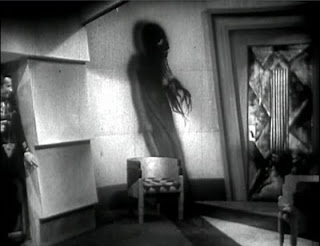In his Editor's Note, Michael Kelly reveals that, as of next year, S&TT will become a yearly paperback (or electronic) anthology of new writing, including some non-fiction - indeed,
this issue includes an excellent essay on 'The Yellow Wallpaper' by V.H. Leslie.
This latest issue is remarkably good even considering the high standard set by previous numbers. What struck me most about the range of stories on offer is how they cover just about every aspect of weird fiction or 'quiet horror'. The traditional and the experimental (or less familiar) approaches to the short story are both well represented here.
First up is Gary Fry with 'New Wave', a tricksy title from one of the ideas men of British horror. The premise is familiar, and indeed nothing could be more traditional than a haunting (apparently) involving a scarecrow - shades of de la Mare, and indeed Robert Westall. But, as the layers of narrative are peeled back, it becomes clear that a rather unconventional ghost is haunting the waving sea of wheat outside the characters' home.
The second story, 'Casting Ammonites', is a short-short by Claire Massey, a new name to me. It's a very accomplished tale that straddles fantasy and science fiction as much as horror. Again, the setting is familiar - we are near Whitby, on the North Sea shore. But who is the mysterious narrator, and what is the significance of the labyrinth of stones he watches over? Certainly, this is not a standard ghostly tale, but it is nonetheless haunting. It reminded me slightly of a (not entirely dissimilar) story by Brian Aldiss, which is another way to saying it's well-written and stays in the mind as a fascinating enigma.
'A Cavern of Redbrick' by Richard Gavin is just as evocative, but takes as its starting point the typical transgressions of childhood. A little boy is told not to play in the old gravel pit. So he explores it, and encounters what may be a ghost-girl. In a tightly-plotted tale, it soon emerges that the ghost has a more than passing interest in the boy, and his family. It's a poetic piece, but with a genuine frisson of horror as the end approaches.
Another new name, D.P. Watt, contributes 'Laudate Dominum (for many voices)'. And again we're slap bang in old-school ghost story mode, with a grumpy traveller in late middle age 'enjoying' a walking holiday in Cornwall. I enjoyed this one a lot, perhaps because it evokes the pros and cons of holidaying in Britain and the joys of finding out-of-the-way attractions. Unfortunately for Watt's traveller, the 'Mechanical Music Museum' proves hard to drag himself away from. As well as being satisfyingly grim, the style here is spikily traditional - indeed, this one might have appeared in an anthology of the Fifties, if not the Thirties.
Vastly different again is 'Moonstruck' by Karin Tidbeck. As with Claire Massey's story, I was reminded of the New Wave science fiction that appeared in the early Seventies, particularly that with a feminist tinge. There is also a Kafkaesque feel to the narrative, in that the story seems able to bear several interpretations. Yet is also a simple fantasy in which the Moon suddenly approaches the earth, actually touching our world's surface. The apparent catastrophe is described in admirably clear prose from the point of view of a girl who becomes convinced she is somehow responsible for the celestial aberration.
Ray Cluley's 'Whispers in the Mist' is a slight tale, and takes us back onto familiar ground - quite literally, as it's about a man wandering around a moor in a fog in the West Country. An outsider is warned by the locals in the pub not to go out into the mist, because the ghosts will whisper and lead men astray. But if the central idea is familiar, the execution is very deft and the final twist is all the more powerful as a result.
'The Other Boy' by Daniel Mills is harder to categorise. Is it a supernatural tale, or a thoughtful account of the deceptive and cruel nature of memory? Both, I daresay. The authenticity of the past - how we remember it, construct it, or lose it - is skilfully handled, not least in the central image of a re-enactment of a skirmish during the American War of Independence. Is the British drummer boy who rescues the protagonist a ghost? Again, this is carefully crafted so that layers are peeled back over time until something of the truth is revealed.
Finally, Lynda E. Rucker ventures to rural Ireland for 'Widdershins', and a different take on the theme of the outsider who Goes Too Far. An American, leaving a wrecked career and private life behind, finds himself stumbling into a bad place, and unwittingly lets loose things best left undisturbed. The story, told in journal form, is all the better for shunning old folkloric menaces in favour of something more primal and less defined. There is horror, carefully understated, but aptly enough there is also hope that an improbable hero may yet triumph.
All in all this is an excellent issue of a title that should be essential reading for anyone interested in supernatural or weird fiction.








